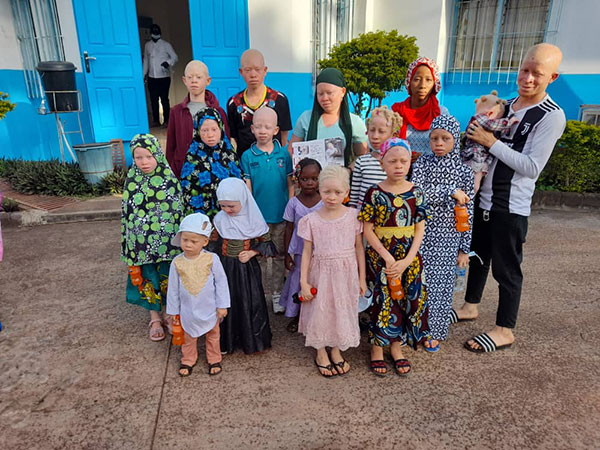Prevention and treatment for people with albinism
— Ivory Coast —

BACKGROUND
Implementation of a treatment pathway to help people with albinism in Côte d’Ivoire was initiated via the Fondation Pierre Fabre’s call for projects presented at the second African Teledermatology Conference in 2019.
The prevention and treatment programme for people with albinism in Côte d’Ivoire follows the roll-out that began in 2016 of a number of similar projects in five African countries: Tanzania, Malawi, Mali, Burkina Faso and Togo. The Ivorian project entails creating a mobile unit offering medical consultations in 10 regions of the country.
Côte d’Ivoire has little epidemiological data on the disease, but the general census performed in 2014 reported some 6,200 people with albinism in the country. Albinism, a misunderstood condition that is still the subject of irrational beliefs, is not only responsible for needless and preventable skin cancers, but is also a stigmatising disease and it is vital that the prejudices around it be dismantled.
A MULTIDISCIPLINARY INITIATIVE
The project revolves around four complementary areas of intervention:
- Information and awareness-raising on the dangers of sun exposure and cancer risks;
- Prevention through creation of a local sunscreen production unit and supply of protective clothing and eye protection;
- Screening and treatment (medico-surgical and ophthalmological care by the mobile unit and referral of severe cases to Abidjan hospital);
- Creation of a patient database to facilitate epidemiological monitoring and conducting research projects.
A MODEL THAT POOLS RESOURCES
The programme is funded by Secours Médico-Social Ivoirien, an NGO that assists albinism sufferers, and brings together many partners: public authorities, members of the scientific and medical communities, and members of civil society.
This cooperation is essential, as it brings together the broadest ensemble of skills and addresses all matters relating to the well-being of people with albinism in Côte d’Ivoire. One example is sunscreen: the formula was developed by the Laboratoires Pierre Fabre in partnership with the Foundation, is produced by the Centre de Prévention des Cancers Cutanés dus à l’Albinisme (Centre for the Prevention of Skin Cancers due to Albinism), and is then distributed to recipients by way of patient associations. There will also be work focused on improving academic support for young patients, employment guidance and resources for job-seekers and support for the elderly.
KEY FACTS
_____
Priority
Dermatology
Programme
2021 – 2025
Type of involvement
Distributor and operator
Objectives
- Organise treatment through the creation of a mobile consultation unit
- Produce and distribute sunscreen
- Train healthcare professionals, raise awareness among patients, families and communities
THE LATEST PROGRESS
_____
Training
Around twenty healthcare professionals based outside the capital trained in how to treat albinism
First external consultations conducted
Over 1,000 people treated (dermatology, ophthalmology and cryotherapy consultations and psychosocial assessment).
Sun care protection kits and 500 pairs of glasses distributed
Opening of the sunscreen production facility
Appeal
Working meeting to call for albinism to be included in health policies, in the presence of the Ministry of Health
Repair of equipment
Renovation of two surgical units at the dermatology department of Treichville University Hospital, to improve the way skin cancers are treated
Launch of a database for patient monitoring
ACHIEVEMENTS AND PERSPECTIVES
Achievements
10
Côte d’Ivoire regions covered by the project
3,100+
patients aided by 2025
50 000
400-gram jars of SPF 50 sunscreen produced over five years
50
local health workers trained in dermatological prevention and treatment
1
Renovation of the operating theatre at the Treichville University Hospital
Perspectives
A three-phase project to secure scaling
- Pilot phase 2020-2022: two years, 1,200 patients, three regions chosen per several criteria (urban areas with high patient concentrations, active patient associations and easily accessible health infrastructures);
- Intermediate evaluation phase: assessment, adaptation and adjustments if necessary;
- Extension phase 2022-2025: three years, 1,900 additional patients, a total of 10 regions. Project implementation based on lessons learned in the experimentation phase.
PARTNERS
- Ivorian Medico-Social Relief
- Department of Galenic Pharmacy, Biopharmacy and Pharmaceutical Legislation, Faculty of Pharmaceutical and Biological Sciences, Felix Houphouet Boigny University of Abidjan
- Ivorian Ministry of Health
- Ivorian Ministry of National Education
- Centre de Prévention des Cancers Cutanés d’Abidjan (Abidjan Skin Cancer Prevention Centre)
- Ivory Coast Society of Dermatology and Venereology
- Local associations of patients with albinism
- Treichville and Bonaké University Hospitals, regional hospitals, general hospitals
See also
Preventing skin cancers due to albinism
Skin cancer is a major risk for albinos, but the number of dermatologists in Africa is far insufficient. The Foundation takes action.
31/07/2018See also
Prevention and early management of skin cancer for people with albinism
Skin cancer is a major risk for albinos, but the number of dermatologists in Africa is far insufficient. The Foundation takes action.
21/09/2018Follow our actions
Mobile Clinics in the Central African Republic: Caring for Survivors of Violence
This unique initiative in the Central African Republic enables thousands of women to access crucial healthcare services and rebuild their lives.




